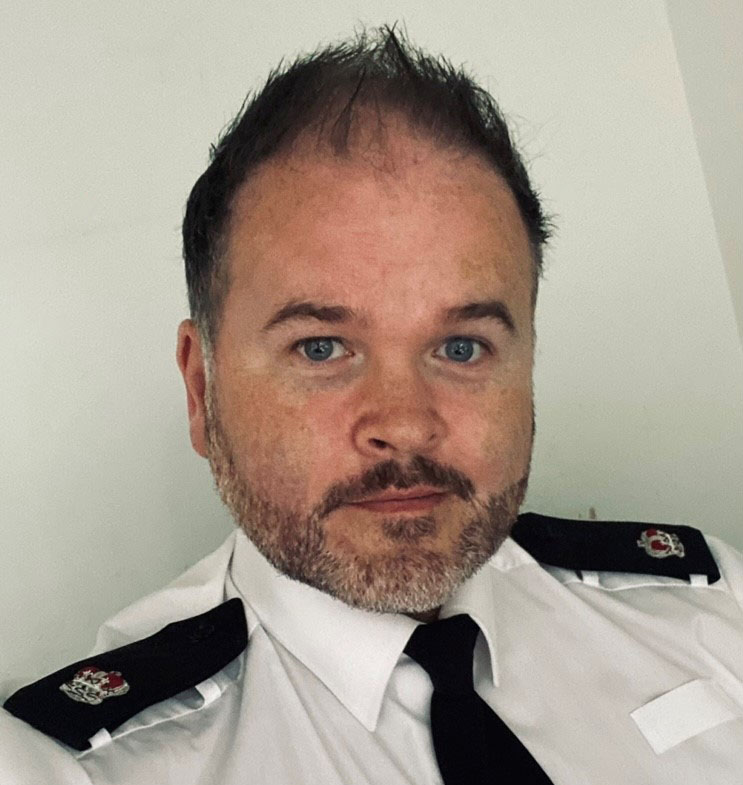Superintendent Ross Campbell of Warwickshire Police shares his experiences as a dyslexic police officer and wants people to know that having dyslexia is not a barrier to success
I’ve been a police officer for 22 years. I joined the service when I was 18. I struggled at school – there was no awareness of dyslexia then, and though my teachers said that I had potential, they mistakenly thought I was a daydreamer and that I didn’t try hard enough. I left school with average GCSE grades. I failed my A-levels, so university was not an option. I had always liked the idea of joining the police service – I reached out to my local Force, who were very supportive and encouraged me to apply. I applied and was successful.

I enjoyed being a police constable, but there were aspects of my role I struggled with, including the paperwork and taking statements. I knew I wanted to progress and I aspired to a leadership role. Unfortunately I failed my first attempt at the sergeants’ exam. I failed part two of the OSPRE exam four times! It was perseverance that kept me going. Each time I failed, I was able to learn from the experience and apply that learning to each new attempt. I was successful in the end, after five attempts.
I didn’t know I had dyslexia then, but I knew there was something that wasn’t quite right. My reading speed was slow and I often found words confusing. I’d never read a book from cover to cover. I also had problems with direction and found it challenging to distinguish left from right. These are traits that I now know are common to dyslexia, but I didn’t have this understanding until the time came for me to pursue promotion to Inspector. On my second attempt at the promotion board, my memory went blank and I lost track of everything I had wanted to share. I just sat there staring into space and I had no idea I was doing it. At that point, I had been a temporary inspector for four years, acting up in the role for that time as there had been no promotion boards. I had a wealth of skills, abilities and experience that I knew would make me an effective inspector, as I had proved that in doing the role for so long. It was incredibly frustrating to be experiencing working memory difficulties at such a crucial time.
Fortunately, the chair of the panel was aware of dyslexia having supported a relative with the condition. On their advice, I looked into the possibility that I might be dyslexic.
My journey accessing formal diagnosis was unfortunately very difficult. Initial screening tools offered by the Force gave contradictory results. I was eventually able to have a clinical assessment, which confirmed my diagnosis. Getting the diagnosis was a very emotional experience. On the one hand, I was thrilled to get the clarity that a diagnosis can give you. On the other hand, I couldn’t help but feel regret over the opportunities I’d missed and how my experiences might have differed, if only I’d known about my dyslexia sooner. I had lived my life and my policing career thinking I was not good enough, and I saw others around me flourish when I struggled. At times, every day was a battle with my own mind.
At that time, policing had little awareness or experience of supporting people with dyslexia. There was disagreement in my Force over accountability for support between Occupational Health and Human Resources (HR). An Access to Work assessment made a number of adjustment recommendations to help remove barriers at work, but there were no policies in place for adjustments for dyslexia. Questions arose around budgeting and there were technical difficulties around assistive software compatibility with Force systems. It was clear from the outset that there was a distinct lack of organisational understanding of dyslexia and how to support dyslexic colleagues.
Talking to colleagues nationally through networks I had begun to build, I identified that this was not an isolated issue. It took 18 months for my adjustments to be put in place. It was a stressful and difficult time, and I wanted to ensure that no one else would encounter the same challenges. I started to get involved in supporting Force awareness and capability around dyslexia inclusion. I took an active role in developing dyslexia policy, processes and practices, and I began a neurodiversity network. I presented my own academic research and workforce survey results to HR leads and to the Assistant Chief Constable, making recommendations around adjustments and processes, and the Force was very supportive. Thanks to their pragmatism, we now have effective policies in place to support officers and staff with dyslexia. Initiatives include using work-based assessors and implementing QuickScan and QuickScreen screening tests, as well as interview adjustments.
“Having access to adjustments was key to my successful promotion to Chief Inspector”
Supt Ross Campbell
I was able to access adjustments for my next Chief Inspector promotion board. It was quite surreal to personally experience the adjustments that I had been able to put in place to support others. The process highlighted how important it is that an organisation works with the individual to consider what adjustments might be helpful and that any potential adjustment should be agreed by the individual affected. Implementing an adjustment without that collaboration and with no consideration of a person’s needs is unhelpful and counterproductive. I worked with HR to introduce appropriate adjustments: I agreed to have three minutes per question during the interview to review the question and consider my answer. It was an option to have the questions beforehand with time to consider them, but I wanted to do that one by one in the interview. I was listened to and supported around my needs. The adjustment removed the need for immediate recall that the traditional interview format demands and gave me the time I needed to consider my answer. Having access to adjustments was key to my successful promotion to Chief Inspector.
My career has gone from strength to strength since my diagnosis. I have obtained qualifications in leadership and management, business administration, and coaching and mentoring. I enrolled to study part-time for a distance learning degree in policing. I graduated with first class honours in 2018. In 2019, I was awarded a College of Policing bursary and have just completed my master’s degree in criminal psychology. This complements my role as a hostage and crisis negotiator. I am now a Superintendent and Head of Digital Services at Warwickshire Police.
Adjustments allowed me to work to my strengths and helped to remove barriers to my success. Feeling listened to, valued, supported and understood also had a massive impact on my confidence. Dyslexic officers and staff have made – and will continue to make – an invaluable contribution to policing. This is something that should be celebrated, due to our out-of-the-box thinking and our natural attention to detail. It’s important to have an inclusive work environment and effective policies that allow dyslexic officers and staff to make this contribution and to unlock their potential.
I had never been successful on the first attempt in any process I had gone through. To date, I have sat eight promotion boards for four ranks. Resilience and perseverance have got me to where I am today. Hopefully, the advances in awareness and support – and in particular, workplace adjustments – will mean that these challenging experiences will be a thing of the past. ∎
Superintendent Campbell is an active campaigner for dyslexia awareness and inclusion. You can follow him on Twitter at @dyslexic_cop
This blog was originally published as part of the College of Policing Workplace Adjustments Toolkit – it is reproduced here with kind permission of the author


